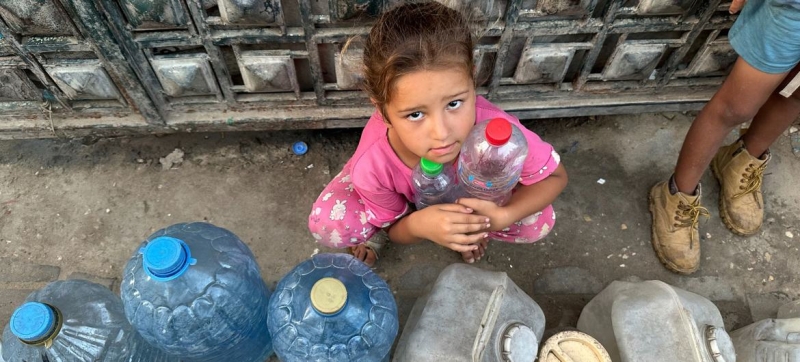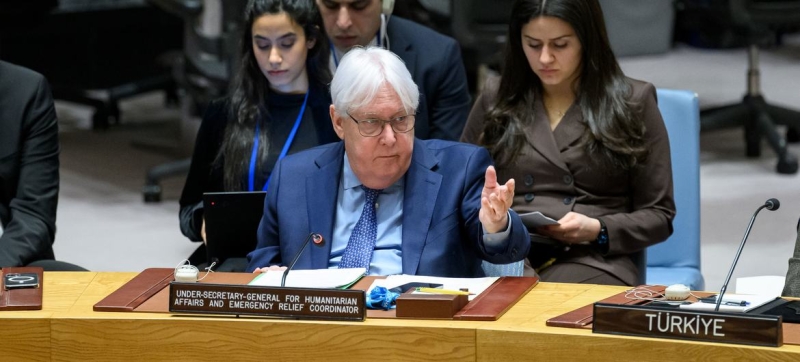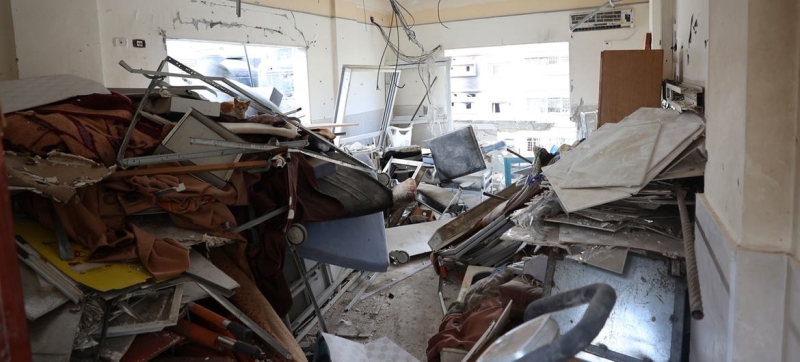
Child in Gaza with water bottles. Humanitarian Coordinator: UN will never abandon Gaza to its fate Humanitarian assistance
UN humanitarian agencies and their partners remain committed to efforts to help Gazans in need, despite the growing dangers of working in the enclave. UN Emergency Relief Coordinator Martin Griffiths announced this on Wednesday.
Commenting on media reports that the UN had previously warned of a halt to humanitarian activities if the security situation and coordination with the Israeli military did not improve, he denied issuing any “ultimatum.” “We continue as we did in for many, many months, to negotiate with the Israeli authorities and other countries with a lot of help, by the way, from the United States, as you know, to achieve the proper conditions for the safe and secure delivery of [aid],” Griffiths said in an exclusive interview with the News Service UN. Let us remind you that in just a few days he will leave his post.
No retreat
“We are not fleeing Gaza at all, but what is true now – and I think this was the basis for those messages – is of course that we are extremely concerned about the security situation in Gaza, where it is becoming more and more difficult to work,” he said UN spokesman. An updated assessment of the food situation in the enclave was released on Tuesday, highlighting the “high risk” of mass starvation “while conflict continues and humanitarian access is limited.”

UN Deputy Chief Humanitarian Officer and UN Emergency Relief Coordinator Martin Griffiths. Aid can make a difference – that’s why we need all the checkpoints and security guarantees, Griffiths said.
Political Focus
This is a political issue , and it is work in this area that should be the focus, he continued. According to him, many diplomatic and mediation efforts have been made in the Middle East, but they have not led to the desired results. After almost nine months of war caused by Hamas attacks and hostage takings in Israel, UN humanitarian agencies continue to report strikes by the Israeli military, casualties among civilians and forced displacement throughout Gaza.
Militancy and Violence
The UN Agency for Palestine Refugees (UNRWA) reported “particularly intense”
recent days of airstrikes in central Gaza, especially in the refugee camps of Burij, Magazi and Nuseirat, as well as in the eastern part of Deir al-Balah. Meanwhile, the Israeli military’s ground offensive “continues to expand,” UNRWA noted, in particularly in southern Gaza City and eastern Rafah, further disrupting humanitarian aid flows. Violence against Palestinians in the West Bank has also continued unabated. In addition, with the escalation between Israel and Hezbollah militants on the Lebanese border, the UN Secretary-General warned that one wrong move could trigger disaster for the entire region and beyond.
Humanitarian assistance in other regions
Griffiths emphasized the UN’s role in supporting people in emergencies around the world. “Last year we helped 144 million people, which is two-thirds of what we hoped to achieve,” he said, noting funding problems. No matter how large the number of people receiving UN assistance, many tens of millions of people in need of support do not receive it due to lack of funds.
“Astonishing Inequality”
The difference between what the world spends on military needs – more than two trillion dollars a year – and what is put into humanitarian aid is staggering, the Emergency Relief Coordinator said. “It’s a disgrace,” Griffiths said. He added that the world needs to get rid of the idea that investing in war is the way to keep the world safe. Reflecting on his four decades of work, Griffiths urged towards radical reform of the global humanitarian system, given growing needs and protracted emergencies.

A hospital in southern Gaza is in ruins.
The will of the people
He noted that the UN, civil society, governments and regional organizations must “start paying attention to the fact that today there is a redistribution of power happening in the world.” The will of the people must be acted upon, he stressed. Griffiths described how in Sudan he met civil society organizations working in emergency rooms “on the front lines, in Khartoum, all over the country.” “They are not going anywhere, and I think they set an example for us all with their dedication. The UN Emergency Relief Coordinator post that Griffiths is leaving is considered one of the most challenging in the UN system due to the constant travel to crisis areas and the attention Media.
“One life saved”
The interlocutor of the UN News Service did not talk about who will head the UN Office for the Coordination of Humanitarian Affairs after him questions (OCHA), and when asked to address the future successor, he responded as follows: “I believe for myself that even one life saved is worth working for. I am amazed by the resilience of communities and the courage of aid workers.”
